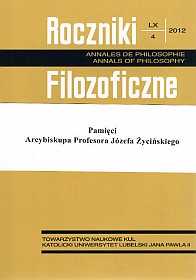Moderately Pluralistic Methodology
Abstract
The paper outlines and discusses the major tenets of moderately pluralistic methodology. The latter is juxtaposed to J. Życiński’s principle of natural interdisciplinarity. It instantiates scientific pluralism as a domain-specific agenda for research. The symbolic and causal understanding are integrated in this methodological conception by means of a specific kind of counterfactual reasoning, which is coined the delimiting counterfactual. It makes the moderately pluralistic methodology applicable to non-experimental research.
References
Ahmed A., Sil R., (2012), “When multi-method research subverts methodological pluralism – or, why we still need single-method research”, Perspectives on Politics, w druku, ss. 40.
Barker C., Pistrang N., (2005), “Quality criteria under methodological pluralism: implications for conducting and evaluating research”, American Journal of Community Psychology 35: 201-212.
Bohman J., (2009), “Pluralism, pragmatism and self-knowledge”, Human Studies 32:375–381.
Carnap R., (1928/1967), the logical structure of the world, tłum. R. George, Chicago.
Cartwright N., (2007), “ Counterfactuals in Economics: A Commentary“, in: J. K. Campbell, M. O’Rourke, H. Silverstein (eds.), Causation and explanation, Cambridge, MA.: The MIT Press, p. 191-216.
Collins J., Hall N., Paul L. A., (2004), “Counterfactuals and Causation: History, Problems, and Prospects”, in: Causation and counterfactuals, Cambridge, MA.: The MIT Press, p. 1-57.
della Porta D., Keating M., (2008), Approaches and methodologies in the social sciences: A pluralist perspective, Cambridge: Cambridge University Press.
Gould J. E., (2002), Concise Handbook of Experimental Methods for the Behavioral and Biological Sciences, London: CRC Press.
Heidelberger M., (2011), “Causal and symbolic understanding in historical epistemology“, Erkenntnis 75: 467–482.
Heller M., Życiński J. (1996), Dylematy ewolucji, Tarnów: Biblos.
Jaffe A., Quinn F., (1993), “Theoretical mathematics: Toward a cultural synthesis of mathematics and theoretical physics“, Bulletin of the American Mathematical Society 29: 1-13.
Kawalec P., (2006), Przyczyna i wyjaśnianie, Lublin: Wydawnictwo KUL.
Kawalec P., (2011), Wstęp, in: Carnap R., Logiczna struktura świata, tłum. P. Kawalec, Warszawa: Wydawnictwo Naukowe PWN, s. XI-CXXV.
Kellert S. H., Longino E.,Waters C. K. (red.), (2006), Scientific pluralism, Minneapolis: University of Minnesota Press.
Knox K., (2004), “A researchers’ dilemma: philosophical and methodological pluralism“, Electronic Journal of Business Research Methods 2: 119-128.
Morgan S. L., Winship C., (2007), Counterfactuals and causal inference: methods and principles for social research, Cambridge: Cambridge University Press.
Rickert H., (1929), Die Grenzen der naturwissenschaftlichen Begriffsbildung. Eine logische Einleitung in die historischen Wissenschaften, Tübingen.
Sankey H., (2000), “Methodological pluralism, normative naturalism and the realist aim of science“, w: R. Nola & H. Sankey (red.), After Popper, Kuhn and Feyerabend: Recent issues in theories of scientific method, Dordrecht: Kluwer Academic Publishers, p. 211-229.
Suppes P., (1978), “The plurality of science“, PSA: Proceedings of the Biennial Meeting of the Philosophy of Science Association, vol. 2, Symposia and Invited Papers, p. 3-16.
Życiński J., (1996), Elementy filozofii nauki, Tarnów: Biblos.
Życiński J., (2006), “The rationality field and the laws of nature“, in: S. Wszołek, R. Janusz (eds.), Wyzwania racjonalności, Kraków: OBI-WAM, p. 87-101.
Życiński J., (2009), “Nauki przyrodnicze i myśl chrześcijańska w komplementarnym dążeniu do prawdy”, in: P. Kawalec, P. Lipski (eds.), Kadry i infrastruktura nowoczesnej nauki: teoria i praktyka, Lublin: Wydawnictwo LBS, s. 19-26.
Życiński J., (2011), Świat matematyki i jej materialnych cieni, Kraków: Copernicus Center Press.
Copyright (c) 2012 Roczniki Filozoficzne

This work is licensed under a Creative Commons Attribution-NonCommercial-NoDerivatives 4.0 International License.





